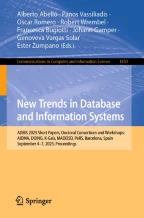Abstract
Quantum Natural Language Processing (QNLP) is a very young area of research, aimed at the design and implementation of NLP models that exploit certain quantum phenomena such as superposition, entanglement, and interference to perform language-related tasks on quantum hardware. To explore the structural relationships between quantum theory and natural languages Lambeq toolkit was created. This first high-level open-source Python toolkit for quantum natural language processing offers a fully automated quantum machine learning pipeline. Lambeq currently includes five compositional models that use varying degrees of syntactic information. While the previous studies focus on Discocat model, the aim of this study is to conducte an extensive evaluation of various classifiers based on different compositional models for text classification applications, focusing on the potential advantages of ensemble learning. The classifiers, including Spider, Cups, Stairs, Tree, and DisCoCat, were examined on two datasets: MC and RP. Performance evaluation was carried out using accuracy, precision, recall, and F1-score as the metrics. The results revealed notable variations in the performance of the classifiers across the datasets. Spider emerged as the top-performing classifier on the MC dataset, achieving remarkable scores of 100% in accuracy, precision, recall, and F1-score. However, on the RP dataset, Stairs outperformed the other classifiers with an accuracy of 68%, precision of 71%, recall of 68%, and F1-score of 69%. Furthermore, ensemble models using hard voting and soft voting techniques were constructed and evaluated. The ensemble models showcased improved performance compared to individual classifiers, with the soft voting ensemble achieving a score of 97% for all metrics on the MC dataset, and a precision of 72% and F1-score of 68% on the RP dataset. These findings highlight the potential benefits of ensemble learning in enhancing the overall performance of text classification tasks on both the MC and RP datasets using soft voting method, allowing for more accurate and reliable predictions.
Access this chapter
Tax calculation will be finalised at checkout
Purchases are for personal use only
Similar content being viewed by others
References
Bouakba, Y., Belhadef, H.: Quantum natural language processing: a new and promising way to solve NLP problems. In: Salem, M., Merelo, J.J., Siarry, P., Bachir Bouiadjra, R., Debakla, M., Debbat, F. (eds.) ICAITA 2022. CCIS, vol. 1769, pp. 215–227. Springer, Cham (2023). https://doi.org/10.1007/978-3-031-28540-0_17
Coecke, B., de Felice, G., Meichanetzidis, K., Toumi, A.: Foundations for near-term quantum natural language processing. arXiv preprint arXiv:2012.03755 (2020)
Coecke, B., Sadrzadeh, M., Clark, S.: Mathematical foundations for a compositional distributional model of meaning. arXiv preprint arXiv:1003.4394 (2010)
Kartsaklis, D., et al.: lambeq: an efficient high-level python library for quantum NLP. arXiv preprint arXiv:2110.04236 (2021)
Lorenz, R., Pearson, A., Meichanetzidis, K., Kartsaklis, D., Coecke, B.: QNLP in practice: running compositional models of meaning on a quantum computer. J. Artif. Intell. Res. 76, 1305–1342 (2023)
Meichanetzidis, K., Gogioso, S., De Felice, G., Chiappori, N., Toumi, A., Coecke, B.: Quantum natural language processing on near-term quantum computers. arXiv preprint arXiv:2005.04147 (2020)
Meichanetzidis, K., Toumi, A., de Felice, G., Coecke, B.: Grammar-aware question-answering on quantum computers. arXiv preprint arXiv:2012.03756 (2020)
Nieto, V.: I. Towards machine translation with quantum computers. Ph.D. thesis, Master’s Thesis, University of Stockholm, Stockholm, Sweden (2021)
Rimell, L., Maillard, J., Polajnar, T., Clark, S.: RELPRON: a relative clause evaluation data set for compositional distributional semantics. Comput. Linguist. 42(4), 661–701 (2016)
Sodré, A., Magalhães, D., Floriano, L., Pozo, A., Hara, C., Machado, S.: COVID-19 portal: machine learning techniques applied to the analysis of judicial processes related to the pandemic. In: Bellatreche, L., et al. (eds.) ADBIS 2021. CCIS, vol. 1450, pp. 109–120. Springer, Cham (2021). https://doi.org/10.1007/978-3-030-85082-1_10
Zeng, W., Coecke, B.: Quantum algorithms for compositional natural language processing. arXiv preprint arXiv:1608.01406 (2016)
Author information
Authors and Affiliations
Corresponding author
Editor information
Editors and Affiliations
Rights and permissions
Copyright information
© 2023 The Author(s), under exclusive license to Springer Nature Switzerland AG
About this paper
Cite this paper
Bouakba, Y., Belhadef, H. (2023). Ensemble Learning Based Quantum Text Classifiers. In: Abelló, A., et al. New Trends in Database and Information Systems. ADBIS 2023. Communications in Computer and Information Science, vol 1850. Springer, Cham. https://doi.org/10.1007/978-3-031-42941-5_35
Download citation
DOI: https://doi.org/10.1007/978-3-031-42941-5_35
Published:
Publisher Name: Springer, Cham
Print ISBN: 978-3-031-42940-8
Online ISBN: 978-3-031-42941-5
eBook Packages: Computer ScienceComputer Science (R0)
